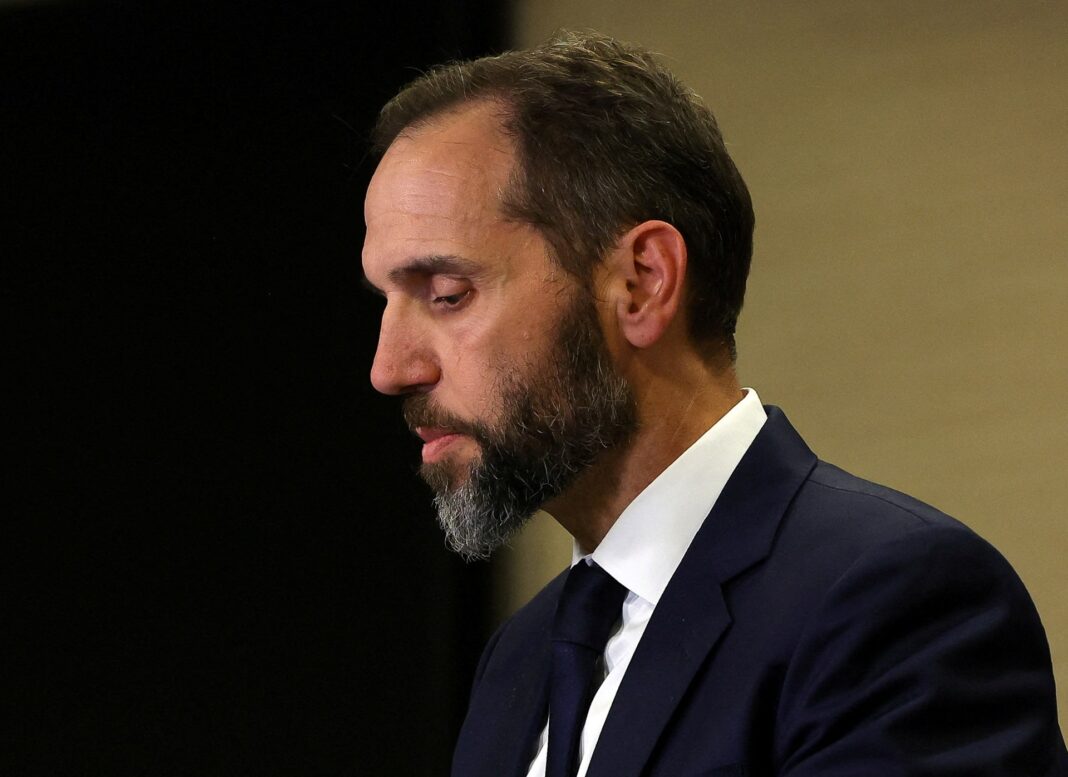Federal prosecutors have asked an appeals court to pause their bid to revive the criminal case against the United States President-elect Donald Trump, who was accused of mishandling classified documents after his first term as president ended.
Special Counsel Jack Smith, 55, made the request on Wednesday in the US Court of Appeals for the 11th Circuit, asking for time to assess the impact of Trump’s pending return to the White House.
“The government respectfully requests the court hold this appeal in abeyance and stay the deadline for the government’s reply brief,” he wrote.
He added the requested pause will “afford the government time to assess this unprecedented circumstance and determine the appropriate course going forward consistent with Department of Justice policy”.
The move has underscored fears that Trump is set to emerge all but unscathed from the two cases filed against him in federal court.
Trump, 78, was accused of illegally holding onto classified documents at his Mar-a-Lago estate in Florida after he left office in 2021.
A federal judge appointed to the bench by Trump dismissed the case in July, after ruling that Smith was improperly handed the special counsel role. Smith and his team subsequently appealed.
On Wednesday, however, Smith wrote that, if the court granted the pause, his office would return a decision on how it planned to proceed no later than December 2, 2024.
His office has already secured a similar pause in a second federal case accusing Trump of attempting to overturn his defeat in the 2020 election, events that concluded with the then-president delivering a fiery speech at a so-called “Stop the Steal” rally on January 6, 2021.
That afternoon, hundreds of Trump supporters stormed the US Capitol to try and stop the certification of Joe Biden as president by the two chambers of Congress.
Cases winding down
Federal prosecutors are looking at how to wind both cases down, based on the assumption that sitting presidents cannot be prosecuted or jailed while in office. They are also aware that, once Trump enters the White House, he would all but certainly have the cases thrown out.
A longstanding Department of Justice policy, dating back to 1973 and the Watergate scandal, also makes it unlikely that President-elect Trump would be pursued on federal criminal charges.
That year, the Office of Legal Counsel argued that the criminal prosecution of a sitting president would undermine his or her authority — a norm that has been upheld in the Justice Department in the years since.
Last July, the conservative-led Supreme Court also ruled that presidents not only had “absolute immunity” from prosecution for any action taken under their constitutional authority, but also “presumptive immunity” for anything that may qualify as an “official act”.
Because of this, Smith was obliged to refile his January 6 case, arguing that Trump had been acting as a private actor when he tried to overturn the election’s outcome.
Reports suggest Smith has for several days been trying to shut down both cases. It has also been reported he plans to complete his work and leave the Department of Justice before Trump returns to the White House.
The president-elect has previously promised to fire him “within two seconds” of taking office.
Stormy Daniels hush money case
Trump still faces legal questions in regard to criminal cases brought by prosecutors in New York and Georgia. Because these are state-level and not federal cases, Trump would not be able to pardon himself in relation to either.
In New York, Trump has already been found guilty of 34 felony charges of falsifying business records, related to efforts to hide hush-money payments to former adult film star Stormy Daniels before the 2016 presidential election.
Prosecutors alleged that Trump wanted to stop Daniels from revealing an alleged 2006 sexual encounter, worrying it could hurt him during his successful 2016 presidential campaign.
As a result of his May conviction, Trump will be the first president to enter the White House with a criminal record.
Judge Juan Merchan was set to sentence Trump on November 26 but granted a stay on all deadlines, pausing court proceedings to give both sides time to consider recommendations in light of his imminent return to the Oval Office.
Experts had said the worst Trump was likely to face would have been a period of house arrest. Now, it seems all but certain that, whatever ruling Merchan makes, the sentence will not be served until Trump leaves the White House in 2029.
Of the four different criminal indictments levelled at Trump, the hush-money case was the only one that went to trial.
Georgia racketeering case
Trump also faced charges over his efforts to overturn the election in Georgia in 2020.
Biden narrowly won the state and the presidency, but Trump and his allies allegedly went on to spread misinformation about voter fraud, pressuring Georgia lawmakers to reverse the result.
The case became complicated with revelations that Fulton County District Attorney Fani Willis had a romantic relationship with Nathan Wade, an outside prosecutor she hired to assist in the proceedings.
Fulton County Superior Court Judge Scott McAfee ruled that Willis could stay in her job if Wade left. Then McAfee dismissed six of the 41 counts in the indictment against Trump.
The president-elect and his co-accused are now asking the court to disqualify Willis over her conduct with a hearing set for December 5.
Civil cases
Trump is also appealing a May 2023 decision that found him liable for sexually abusing and defaming E Jean Carroll.
Trump was ordered to pay the writer more than $83m.
The president-elect is similarly appealing a $478m judgement that found he and his company had manipulated property values fraudulently, in a civil fraud case brought by the New York attorney general, Letitia James.







